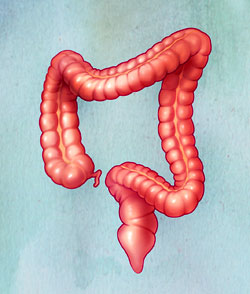 Ulcerative colitis is a chronic, recurring disease of the large bowel (the colon) that is characterized by inflammation and ulcers that form in the lining of the colon.
Ulcerative colitis is a chronic, recurring disease of the large bowel (the colon) that is characterized by inflammation and ulcers that form in the lining of the colon.
The cause of ulcerative colitis is unknown, but some experts believe that a defect in the immune system or an unidentifiable microorganism or germ may be responsible.
FAQs
Patients typically experience cramps, abdominal pain and diarrhea that is slightly bloody. In more severe cases, diarrhea is very severe and frequent. Loss of appetite and weight occur. When the disease is localized to the rectum (as opposed to the entire colon), the symptoms are rectal urgency and the passage of small amounts of bloody stool. Usually, the symptoms tend to recur.
An initial diagnosis can be made based on the symptoms, but blood and stool tests are also performed to rule out an infection that can mimic colitis. A visual examination of the lining of the rectum and lower colon (sigmoidoscopy), or of the entire colon (colonoscopy) is always required. Small, painless biopsies can also be taken which show certain features of ulcerative colitis.
The disease can affect nutrition, causing poor growth during childhood and adolescence. Liver, skin, eye or joint (arthritis) problems occasionally occur, even before the bowel symptoms develop. Other problems can include narrowing and partial blockage of the bile ducts.
In long-standing ulcerative colitis, colon cancer is a major concern. The risk of developing colon cancer increases significantly when the disorder begins in childhood, has been present for eight to 10 years, or when there is a family history of colon cancer.
Colitis may be treated with steroids, other anti-inflammatory drugs and immune system suppressors.
There are few diet restrictions for people with colitis, but they can include bulky foods, milk and milk products. You should eat a healthy, well-balanced diet with adequate protein and calories. A multi vitamin is often recommended. Iron may be prescribed if anemia is present.
Most patients with this disease respond well to treatment and go about their lives with few interruptions. However, some attacks may be severe, requiring a period of hospitalization and intravenous treatment.
Surgery may be recommended for people with longstanding colitis that is difficult or impossible to control with medicine. In these rare cases, the patient’s lifestyle and general health have been affected significantly. Surgical removal of the colon cures the disease and returns good health and a normal lifestyle. In these cases, advances in surgery have eliminated the need for an ileostomy (or using an external bag) to replace the removed portion of the colon.